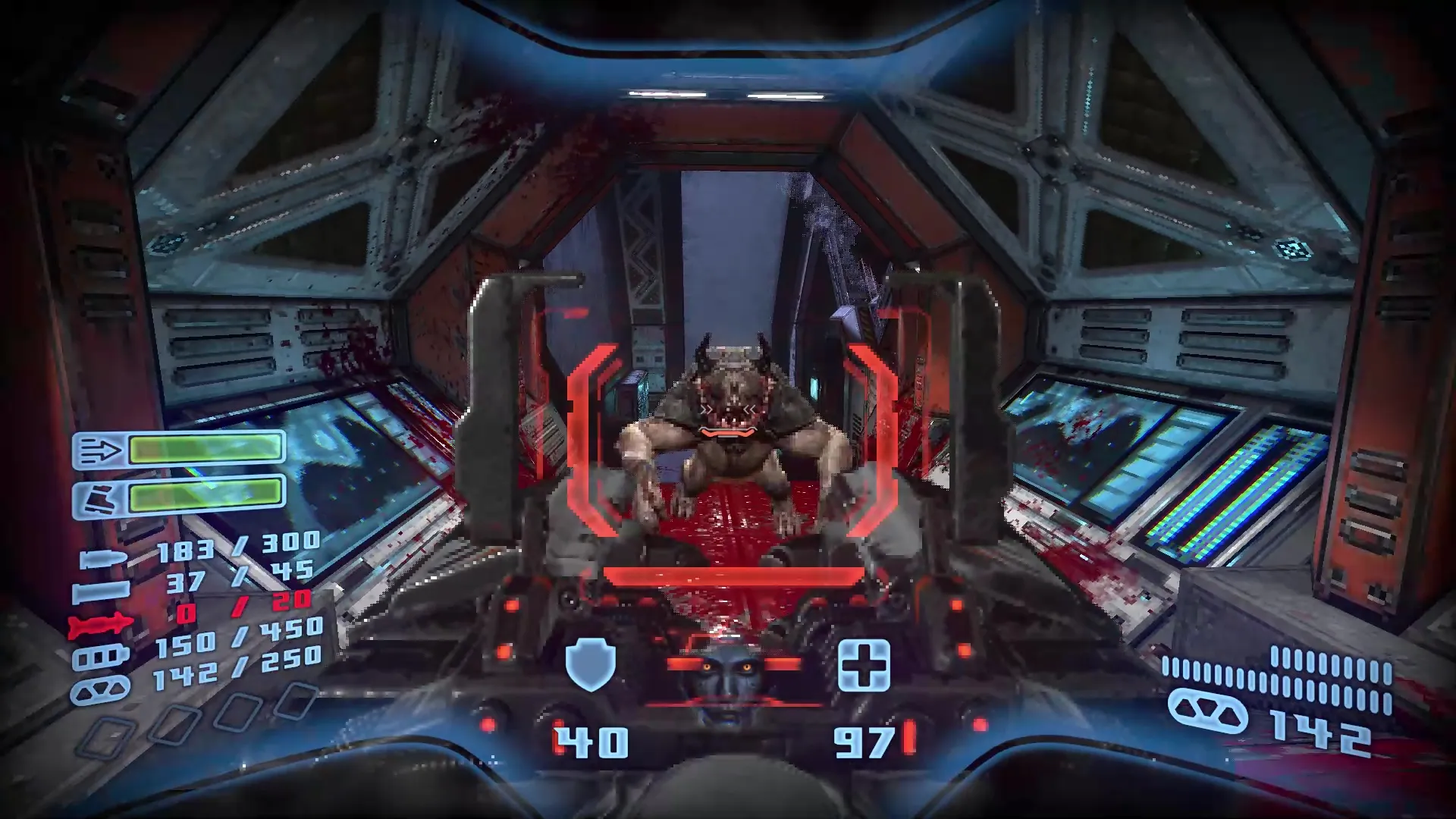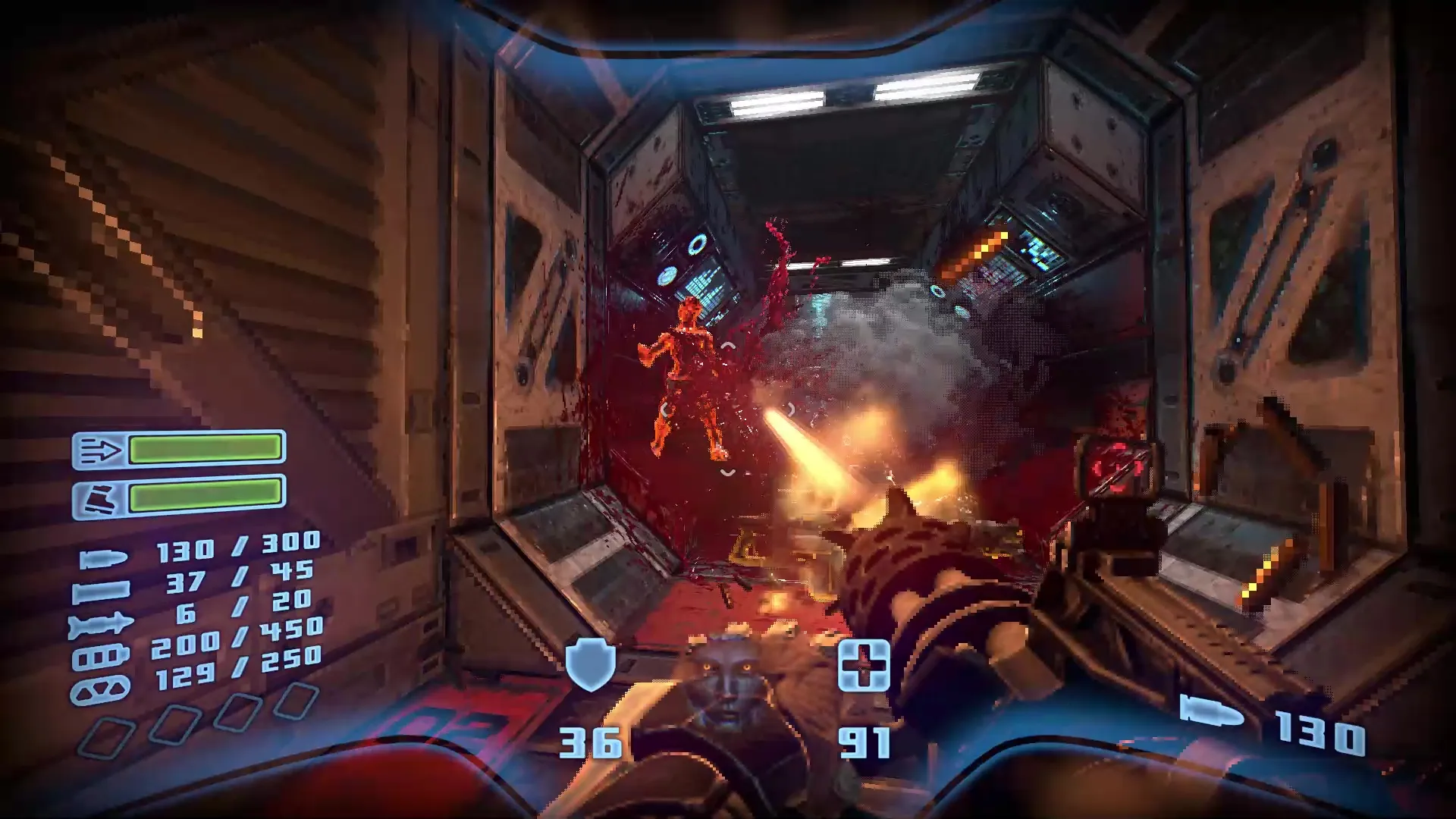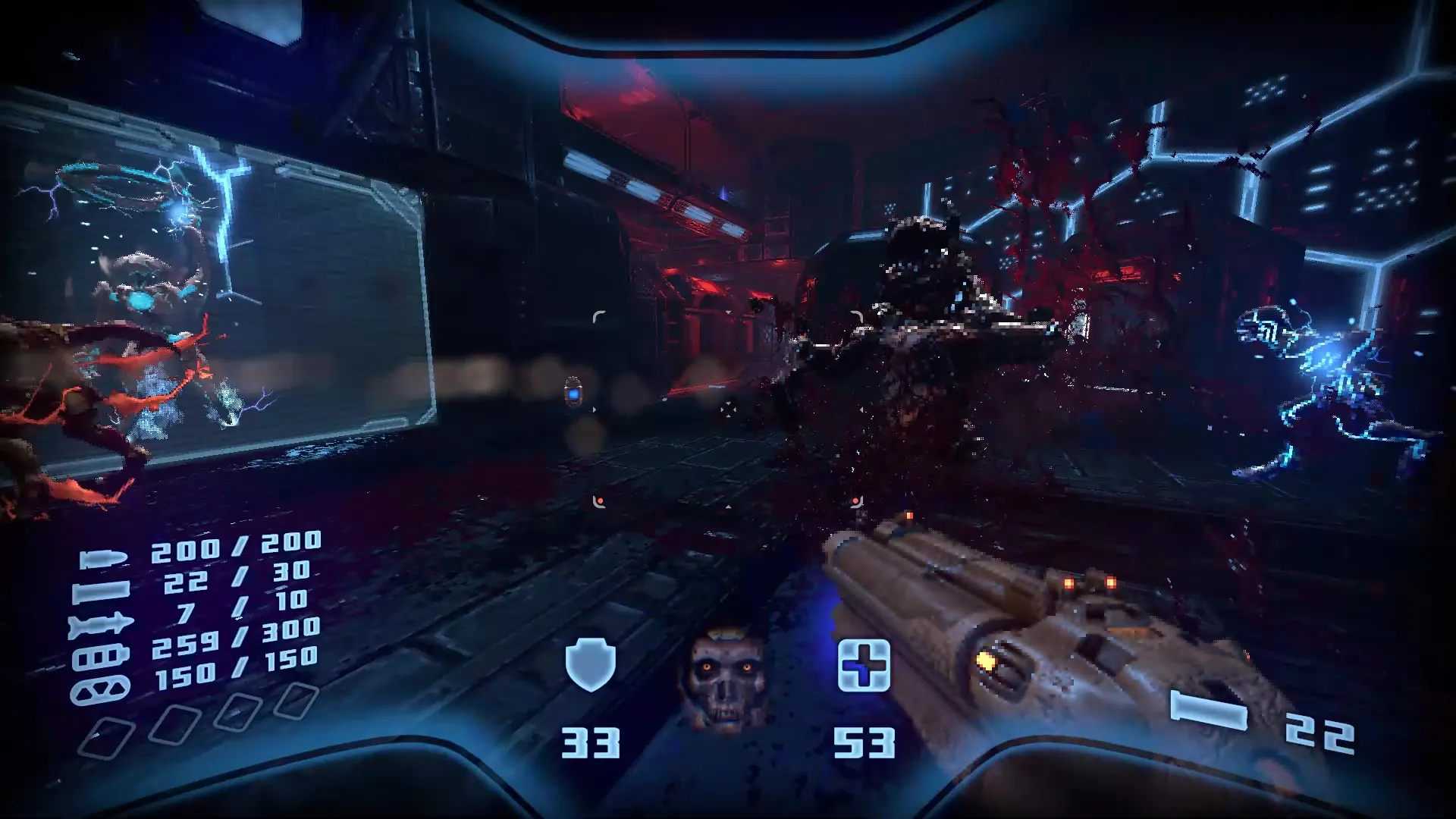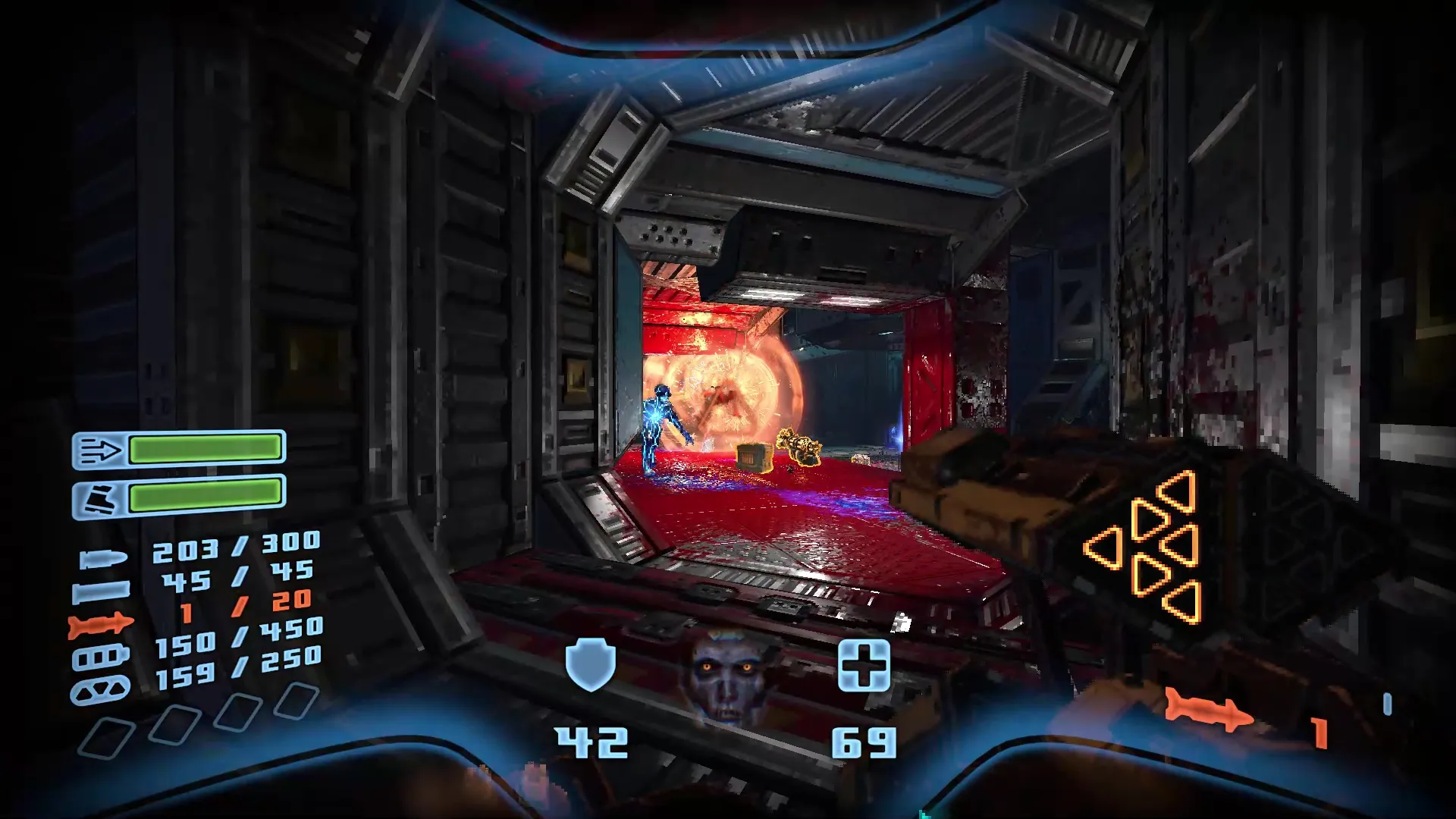A few years ago, while discussing a couple of retro-styled strategy games, a friend made an interesting distinction. There’s a difference between how you remember a genre, he said, and how playing it actually felt. By that metric, Prodeus is a version of Doom that we could only imagine existing in the ’90s.
I don’t care for the term “boomer shooter.” Actual Boomers, in my experience, play ultra-realistic military action games, ideally set in World War II. That being said, Prodeus is an ideal example of the subgenre.
If your idea of a good time in an FPS is circle-strafing at Mach 10 while you hot-swap between a dozen guns to turn an army of demons into angry paint, then Prodeus was made for you. For everyone else, it’s going to depend on your tolerance for speed, speed metal, and high-speed murder.
Prodeus Review: That’s One Doomed Space Marine
The story of Prodeus is nearly irrelevant. I think researchers experimenting with alien technology have turned a human mining colony into a warfront between demons (Chaos) and aliens (Order; also, the titular Prodeus).
You’re one of the last human survivors, turned into a cyborg by Prodean technology. Initially, you’re out to shoot everything you see, but then you get the chance to shut down the Order/Chaos incursion. This will, happily, require you to shoot everything you see.
The plot is about as relevant moment-to-moment as Doom‘s. This is a critical comparison, because Prodeus comes off like a particularly thorough total conversion mod for Doom.
The primary enemies are close matches with Doom‘s rank-and-file demons (Fiends are Imps, Bloaters are Cacodemons, Skull Fish are Lost Souls, etc.), your initial arsenal is similar, and it has an onscreen character portrait that gets increasingly skeletal as your health drops. If you showed a hardcore shooter fan Prodeus footage and told them it was a new Brutal Doom, they’d believe you.
Blood on the Walls
Prodeus sets itself apart from Doom in a lot of little ways. The soundtrack is heavy industrial; the stages are nicely cluttered and vertical; and every weapon has a useful alt-fire mode. Exploring each level reveals hidden ore samples you can exchange for upgrades, like a double-jump or the weirder guns.
Most importantly, Prodeus has some of the most satisfying kills I’ve ever seen in an FPS. Every enemy in Prodeus takes location damage, can be dismembered, has multiple death animations, and will splatter if hit hard enough. The first couple of times I killed a monster in a confined space, I thought I heard another enemy’s footsteps afterward, but it was actually the sound of the last demon’s corpse bits bouncing off the walls.
Even better, demons’ bodies disappear in Prodeus, but bloodstains don’t. You can track your passage through each level by the gore you’ve left behind, especially once you’ve unlocked some of the more destructive weapons. Prodeus‘s version of the super shotgun has four barrels, you can alt-fire to hit something with all four shells at once, and doing so turns the target into a modern art project.
The stage design does take a while to take off. For the first 75% of the single-player campaign, you’re fighting through a procession of dark industrial environments. It’s not until the endgame that things get more interesting. There’s one all-time great level where you fight your way onto and back off a space station, and there are a few more where the stages distort around you as you progress.
Even so, Prodeus‘ 10-hour base campaign runs out of steam before the end. Chaos and Order field most of the same enemy types; Chaos throws more cannon fodder at you, whereas Order has fewer but tougher monsters in each wave. By the last couple of stages, every second wave is primarily comprised of tiny explosive monsters, visibly just there to inflate your kill count.
The real climax of the game comes early, on the stage Hexarchy. It’s the toughest challenge in the default campaign, as an ersatz boss rush against the forces of Order, and almost everything after it is a step down.
Even the final boss is a relative pushover compared to Hexarchy, because he challenges you in a small room, and you’ve got at least two different grenade launchers. Welcome to splash damage hell, lunch meat. You aren’t leaving.
Infinite Murder Party
Prodeus has a robust albeit user-unfriendly level editor built into the PC version, with a big community of creators that have been playing the game for the last couple of years via Steam Early Access.
While this is a particularly masochistic audience — it seems like all the best-reviewed maps are also the most brutal — it gives you substantial content to blast through once you’re done with the campaign. At the time of writing, the Xbox version doesn’t have the level editor, but it does have the Community Workshop option in its UI, which has nothing in it. Maybe crossplay is coming later.
It also seems like the multiplayer modes are dead on arrival; I was never able to get a pick-up match going during my time with the game. It does give you the option to build your own maps, then bring up to three friends for whatever custom-made FPS experience you’re looking for.
Prodeus Review — The Bottom Line
Pros
- Nicely bite-sized servings of absolute mayhem.
- Almost all the weapons feel great to use.
- Really satisfying enemy death animations.
- Smooth, customizable difficulty curve.
Cons
- Some weapons’ muzzle flash is so intense you can’t see what you’re aiming at.
- Maybe a little too much of an assault on the senses.
- The last boss of the campaign is a comparative pushover.
- Could’ve used a few more enemy types.
Prodeus is one of those Kickstarter success stories. It’s laser-focused on a specific audience that knows what it wants: dark metal, bloody kills, and fast-paced action. It’s self-billed as “the boomer shooter you’ve been waiting for” and just about lives up to that hype.
At the same time, it’s got some of the typical crowdfunding pitfalls, like visible inconsistencies and obvious design creep. Some of the guns aren’t in the base campaign, the most challenging stage isn’t anywhere near the finale, and it takes a while before you reach the best levels.
It’s still one of the better action games I’ve played this year, and I can see myself loading it up again whenever I’m in the mood for some stylized ultraviolence. Whatever issues I have with Prodeus become as irrelevant as its storyline whenever I liberate a demon’s entire upper half with one four-barreled shotgun blast.
[Note: Humble Games provided the copy of Prodeus used for this review.]










Published: Sep 27, 2022 04:09 pm